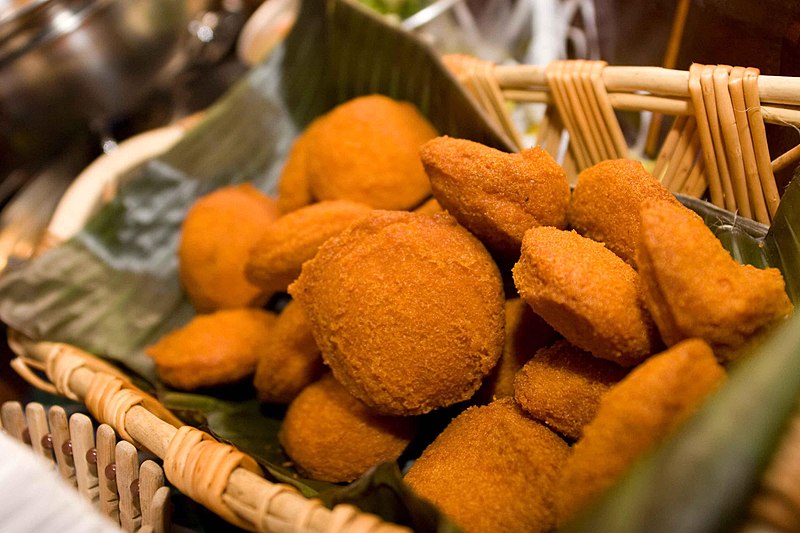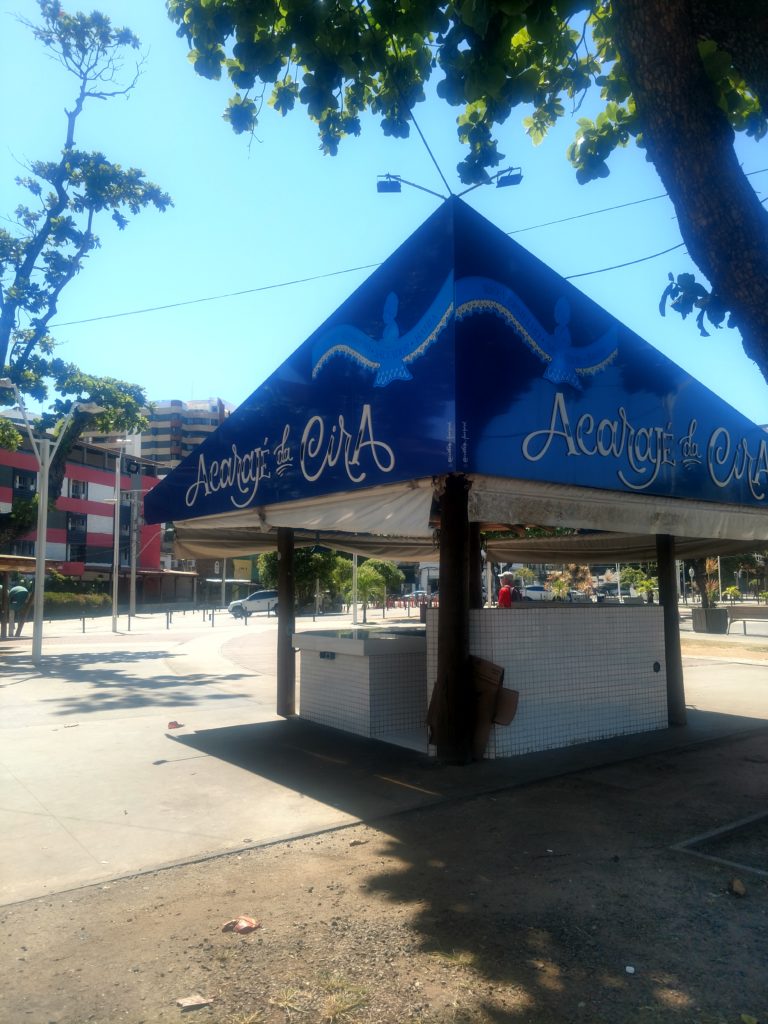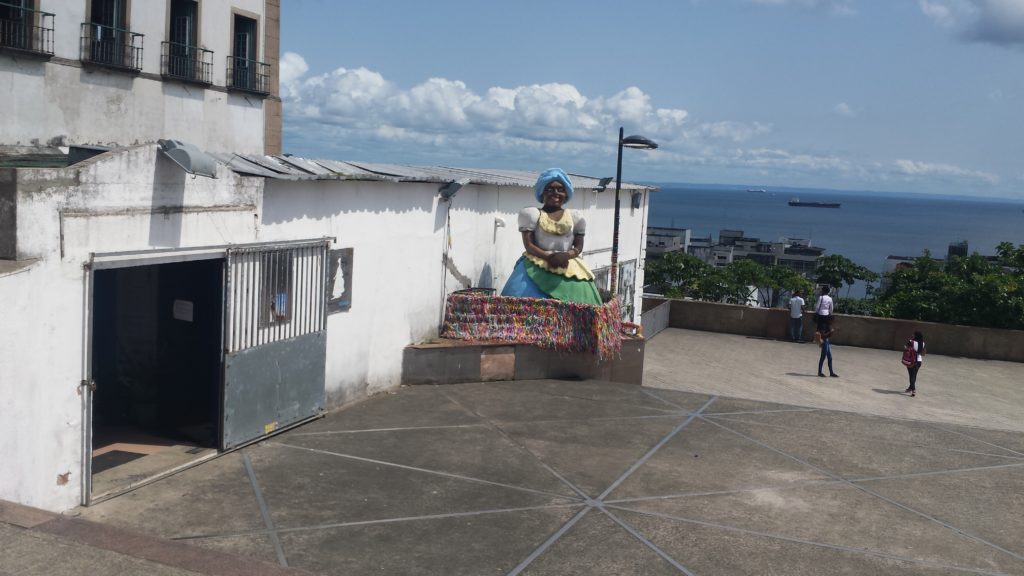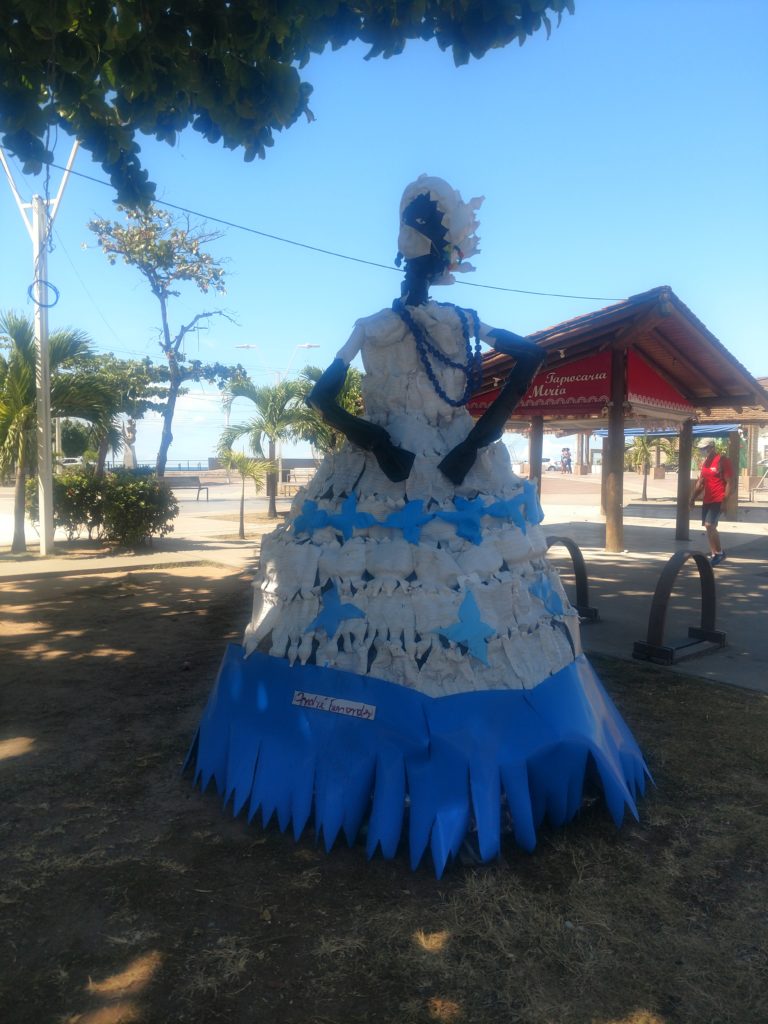
Acarajé, Religious Attire, and Conflict in Brazil
Danielle Boaz
Baianas de Acarajé / October 18, 2007 / Wikimedia Commons
This article is part of our “Clothed in Religion: Law and Religious Attire/Garb” series.
If you’d like to check out other articles in this series, click here.
The government of Brazil has widely recognized and protected acarajé — a food that originates from Candomblé (an Afro-Brazilian religion), as an important part of the nation’s cultural heritage. In the city of Salvador, Bahia, part of this protection includes requiring sellers to wear Candomblé religious attire. This essay briefly explores the controversy over this rule and places it in the broader context of discrimination and violence against acarajé sellers and Afro-Brazilian religions.
Background
Brazil is a nation with strong African roots. During the Atlantic slave trade, more than 4.8 million enslaved Africans disembarked in Brazil. This number, which was higher than that of any other colony, represented approximately 45% of all the enslaved Africans who landed in the Americas. Today, people of African descent comprise slightly more than 50% of the population of Brazil and Brazil has the largest population of people of African descent outside of the African continent. Salvador da Bahia, a city in the northeast which served as Brazil’s first capital, is considered to be the second largest predominantly Black city in the world, smaller only than Lagos, Nigeria.
Most of the cultural attractions for which Brazil is known, such as samba and capoeira, have deep roots in Black communities. Food and religion are no exceptions. Many of the country’s traditional dishes, especially those in the northeast of the country, are derived from African cuisine and/or developed in enslaved communities. Although their devotees officially comprise less than one percent of the population of Brazil, Afro-Brazilian religions are frequently marketed as the face of the nation, as seen in everything from the iconic statues of the orixás (divinities honored in some Afro-Brazilian religions) at Dique do Tororó to the replica ilekes (sacred necklaces) sold in the Historic Center of Salvador.
Acarajé
Acarajé is a fritter which is made of black-eyed peas and fried in dendê (palm oil). In Candomblé, acarajé is used as an offering to certain orixás. However, it also became a secular food product more than a century ago when (mostly female) enslaved day laborers began selling it. These women became known as “Baianas de Acarajé” and were considered to be the mediators between the Candomblé terreiro and the public street. They wore their religious attire, including a long skirt and a smock, while selling this fritter. The sale of acarajé is believed to be one of the first female-dominated professions in the country.

Acarajé is an incredibly popular street food in Brazil, especially in the northeast, where larger percentages of people of African descent reside. The Association of Baianas de Acarajé reports that there are an astonishing 4,000 registered acarajé sellers in the state of Bahia alone. In addition to the physical presence of Baianas preparing and selling acarajé in public spaces throughout the state, Allan Dawson explains that the Baianas themselves, “often depicted cooking and selling acarajé,” have “become the very public face of Bahia in tourist brochures, in cardboard cutouts displayed in Salvador’s airport, in front of jewelry stores and shopping malls.”
Indeed, in 2002, the mayor of Salvador proclaimed that acarajé was part of the city’s “cultural heritage.” Three years later, in 2005, the National Institute for Historic and Artistic Patrimony (Instituto do Patrimônio Histórico e Artístico Nacional) (IPHAN) declared that the “craft of the Baianas de Acarajé” was intangible Brazilian heritage. Then, in June 2009, IPHAN created the Baianas de Acarajé museum in Pelourinho, the historic center of Salvador.
In addition to protecting acarajé as a form of cultural heritage, the city of Salvador also passed a series of laws that ensure that acarajé sellers follow certain traditions. The first of these laws was passed on November 25, 1998. Alongside other regulations about where acarajé can be sold and the type of equipment that may be used, the municipal law requires acarajé sellers to “wear typical clothing according to the tradition of Afro-Brazilian culture.” Nearly twenty years later, in September 2015, the city of Salvador implemented new regulations governing acarajé sellers that, among other requirements related to licensure and health inspections, more specifically addressed religious attire. Rather than just stating that acarajé sellers must wear “typical clothing” of “Afro-Brazilian culture,” this law specifies that women must wear a smock, “torso” (wrap), and skirt in white or printed fabric and men must wear a “cofió” (hat) and dress in pants, a shirt, and a smock in white fabric. If a seller wears “clothing in disagreement with the tradition of the baiana and baiano of acarajé,” they can be fined or lose their license. Later, in 2018, the city government declared that November 25, the date of the initial decree mandating that acarajé sellers wear “traditional” attire, would be recognized as the National Day of Baianas de Acarajé.
The government’s recognition of Baianas de Acarajé as intangible heritage and the passage of the regulations requiring sellers to wear “traditional attire” were, at least in part, a direct response to the fact that Brazilian Evangelicals had begun selling acarajé in their own way. First, they renamed the traditional Candomblé dish, referring to it as “acarajé of Jesus” or “bolinhos de Jesus” (“Jesus fritters”). Some of these Evangelical “acarajé” sellers even slightly modified the way that they make the fritter, frying it in vegetable oil instead of the traditional palm oil (dendê) that is sacred in Candomblé. Finally, and most significantly for this essay, they dressed in street clothes such as shorts and t-shirts instead of the distinctive skirt, frock, and beaded necklaces that Candomblé devotees wear.
Evangelicals strongly contested these regulations, arguing that because Brazil is a secular state, it cannot force acarajé sellers to wear “traditional” clothes. They contended that requiring someone to wear the religious attire of Candomblé is tantamount to making them practice or celebrate Candomblé.1Adriana Martins Dos Santos, “O Reino de Deus no Legislativo Municipal: Bolinhos de Jesus, Orixás do Tororó e Outras Historias,” Sociabilidades Religioas: Mitos, Ritos, Identidades, XI Simpósio Nacional Da Associação Brasileira de História Das Religiões,” (2009): 11 They also argued that, through these regulations, the government was promoting Candomblé. The city council was not swayed and insisted that their regulations were designed to preserve a tradition or aesthetic; they were not promoting religious practice. One will notice that in these laws, the legislators referred to the typical clothing of Afro-Brazilian culture, rather than the religious attire of devotees of Candomblé. This clearly seems to be an attempt to reinforce the supposedly secular nature of their regulations.
Context
There are several important things to note about the broader context of this controversy. The first significant fact is that despite widespread efforts to protect the sale of acarajé as an aspect of Brazilian heritage, and perhaps in part because of these measures, acarajé sellers have been discriminated against frequently in recent years. In 2009, in the Historic Center of Salvador in front of the Baianas de Acarajé museum, a large statue of an acarajé seller was constructed. She was portrayed as a Black woman wearing a traditional white dress and headwrap. On December 14, 2019, unknown vandals set fire to the monument. They completely destroyed the statue as well as the outside wall of the museum, which also serves as the office for the National Association of Baianas de Acarajé.

Baianas de Acaraje. This photo depicts the statue that was burned in 2019 and was taken by Boaz in August 2019 in Pelourinho, Salvador (Bahia).
Acarajé sellers themselves have also been attacked in various parts of the country. For instance, in November 2020, Maria Enoia de Souza opened an acarajé stand in Ponta Negra, Rio de Janeiro. Within a month, she began receiving threats. Shortly thereafter, unknown individuals vandalized the stand, damaging the structure and stealing the tent that covered it. De Souza moved the stand after this attack. However, merely two months later, in February 2021, arsonists set fire to the acarajé stand, destroying everything.
In addition to these attacks against acarajé sellers and public representations of them, there are numerous examples of discrimination against Afro-Brazilian religions in every part of the nation. Over the past three years, I have been working on a project tracking cases of discrimination and violence against Afro-Brazilian religions, a phenomenon which some devotees and activists refer to as “religious racism.” I have published a report, spreadsheet, and interactive maps that display and analyze 500 cases of discrimination against Afro-Brazilian religions since the start of 2000. Of these cases, nine center on religious attire and dozens more relate to the right to wear religious attire in public.
Ironically, some of these cases involve discrimination by government officials. Perhaps the most common cases involve school officials refusing to allow students to wear ilekes underneath their shirts. On several occasions, public bus drivers have refused to transport devotees who were dressed in religious attire. Additionally, several male devotees have been prohibited from wearing an eketé (a type of hat that protects the wearer from negative energies) into government buildings such as courthouses. One such case even took place in the city of Salvador.

Devotees have also experienced harassment and violence when they go out in public wearing their religious attire. Store owners and employees have refused to serve them. Store attendants, particularly in supermarkets, have called them devil worshippers and physically accosted them. In one particularly violent incident, Evangelicals stoned a family of devotees as they were walking home from a Candomblé ceremony. They hit an eleven-year-old girl named Kailane in the head, knocking her unconscious.
The strangest but most concerning manifestation of this form of private discrimination is primarily taking place in the state of Rio de Janeiro. As I have explored in greater detail elsewhere, drug traffickers who have become associated with extremist sects of Evangelical Christianity have been targeting Afro-Brazilian religious communities in recent years. Since at least 2005, the leaders of these drug trafficking gangs have been prohibiting residents of the communities that they control from wearing white clothing or any other symbols of Afro-Brazilian religions. People who have failed to comply have been threatened and forcibly evicted. More recently, these bans on religious attire have been combined with extreme violence against devotees. Traffickers have invaded religious communities, threatened and assaulted devotees, and vandalized and burned down temples.
When one considers the constant discrimination and violence against devotees of Afro-Brazilian religions, the government’s policies toward acarajé are perplexing. They have protected the tradition of wearing religious attire to sell acarajé but have not prevented violence against acarajé sellers nor protected devotees of Candomblé and other Afro-Brazilian religions as they are attempting to navigate public spaces while wearing their religious attire. It is as if the public representations of Brazil’s African heritage are more important to government officials than the present-day devotees of the religion that birthed these traditions.
Conclusion
This essay has discussed an unusual type of regulation of religious attire that exists in Salvador da Bahia, a large city in the northeastern region of Brazil. Unlike many nations who are restricting the ability to wear religious attire in public, the city of Salvador has mandated that sellers of acarajé wear the stereotypical attire of devotees of Candomblé to honor the religious roots of this heritage dish. These regulations came about because sellers who are not from Candomblé, especially those who are Evangelicals, began wearing street clothes and making other modifications to traditional methods of preparation and sale of acarajé.
While the Brazilian government has been quick to recognize and protect Afro-Brazilian religious foodstuffs as a part of the national heritage, it has not provided similar protections to devotees who wear attire for religious purposes. This disparity is part of a larger failure of the Brazilian government to address the recent onslaught of discrimination and violence against Afro-Brazilian religious communities. This problem, which some devotees and activists refer to as “religious racism,” occurs largely unchecked while the government continues to capitalize on a public image and tourist economy built on Brazil’s African (religious) heritage. ♦

Dr. Danielle N. Boaz is an Associate Professor of Africana Studies at the University of North Carolina at Charlotte and a Fellow at the Public Religion Research Institute (2022-2023). She is also the President of the International Commission to Combat Religious Racism.
Recommended Citation
Boaz, Danielle. “Acarajé, Religious Attire, and Conflict in Brazil.” Canopy Forum, December 12, 2022. https://canopyforum.org/2022/12/12/acaraje-religious-attire-and-conflict-in-brazil/

